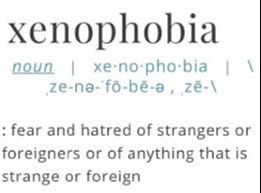Xenophobia

What is Xenophobia?
Xenophobia is an intense fear, dislike, or prejudice towards people from other countries or cultures. It is a form of intolerance that manifests as hostility, discrimination, or even violence against individuals who are perceived as foreigners or outsiders. Xenophobia can arise from a variety of factors, including economic concerns, cultural differences, social or political tensions, and fear of the unknown.
Who's at risk for Xenophobia?
Xenophobia can affect individuals from all walks of life and across various societies. However, certain groups may be more vulnerable to xenophobic attitudes and actions, including:
- Immigrants and refugees: Individuals who have migrated to a new country or seek asylum are often at higher risk of experiencing xenophobia due to their perceived differences and status as newcomers.
- Minority ethnic or religious groups: People belonging to minority ethnic or religious groups may face discrimination and prejudice based on their cultural background, traditions, or beliefs.
- Socioeconomic factors: Xenophobia can be fueled by economic concerns, such as job competition or resource allocation, which may lead to resentment towards foreign workers or marginalized communities.
- Political climate: Societies experiencing political unrest, nationalist movements, or economic instability may be more prone to xenophobic sentiments and actions.
What causes Xenophobia?
Xenophobia is a complex issue influenced by various social, economic, cultural, and psychological factors. Some common causes and contributing factors include:
- Fear and insecurity: Xenophobia often stems from fear of the unknown or perceived threats posed by individuals from different backgrounds. This fear can be exacerbated by economic instability, political tensions, or social change.
- Stereotyping and prejudice: Preconceived notions, stereotypes, and biases against particular cultures or ethnicities can fuel xenophobic attitudes and actions.
- Economic factors: Economic concerns, such as unemployment or financial strain, can lead to scapegoating and blaming immigrants or foreigners for economic hardships.
- Political rhetoric: Political leaders or movements that promote nationalist ideologies or foster a sense of "us versus them" can contribute to xenophobia by emphasizing divisions and fostering hostility towards outsiders.
- Lack of education and exposure: Ignorance or lack of exposure to diverse cultures and experiences can contribute to misunderstandings, stereotypes, and xenophobic attitudes.
How does Xenophobia manifest?
Xenophobia can manifest in various ways, ranging from individual acts of discrimination to organized hate crimes. Some common manifestations include:
- Verbal abuse and slurs: Xenophobic individuals may use derogatory language or slurs to demean and belittle people from other cultures or nationalities.
- Social exclusion: Foreigners or individuals perceived as outsiders may be marginalized or excluded from social, economic, or political opportunities.
- Discrimination: Xenophobia can lead to unfair treatment or discrimination in various areas of life, including employment, housing, education, healthcare, and access to public services.
- Hate crimes and violence: In extreme cases, xenophobia can escalate into hate crimes or acts of violence targeting individuals or communities based on their ethnicity or nationality.
It's important to note that xenophobic attitudes and actions are harmful not only to the individuals targeted but also to society as a whole, as they undermine social cohesion, diversity, and the principles of equality and human rights.
How can Xenophobia be addressed?
Addressing xenophobia requires a collective effort from individuals, communities, institutions, and policymakers. Some strategies to combat xenophobia include:
- Education and awareness: Promoting cultural diversity, inclusivity, and empathy through education can help challenge stereotypes and foster understanding among different communities.
- Building bridges: Encouraging dialogue, interaction, and collaboration between diverse groups can help break down barriers, promote empathy, and challenge xenophobic attitudes.
- Legislation and policies: Enacting and enforcing laws that protect individuals from discrimination based on their ethnicity, nationality, or immigration status can send a strong message that xenophobia is unacceptable.
- Media responsibility: Media outlets can play a crucial role in combating xenophobia by portraying diverse perspectives, challenging stereotypes, and promoting positive narratives about immigrants and foreign cultures.
- Community engagement: Creating spaces for open dialogue, intercultural events, and community initiatives can foster connections and promote integration among different communities.
- Leadership and advocacy: Political leaders, community influencers, and organizations can take a stand against xenophobia, promote tolerance, and advocate for inclusive policies and practices.
It is essential for individuals to confront their own biases, challenge stereotypes, and promote acceptance and inclusivity in their own lives and interactions.
Where can I go for more information on Xenophobia?
For more information on xenophobia, you can consult reputable organizations and resources dedicated to human rights, equality, and social justice. International organizations like the United Nations (UN) and non-governmental organizations (NGOs) such as Amnesty International or Human Rights Watch often provide resources, reports, and campaigns addressing xenophobia and its impact on individuals and communities. Additionally, local human rights organizations or community groups working on diversity and inclusion issues in your area may provide valuable information and resources.

